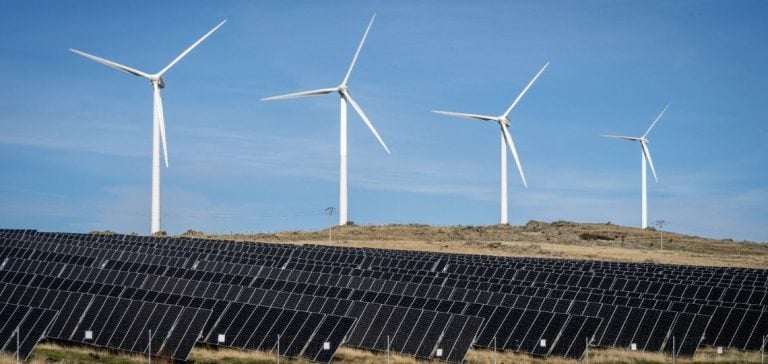Spain recently adopted an energy roadmap that sets an ambitious target: 81% of electricity generated in the country must come from renewable sources by 2030.
This commitment exceeds by seven points the targets previously set for 2021, which called for a 74% share.
The strategy, approved by Pedro Sánchez’s government and submitted to the European Commission, is in line with Spain’s commitments in the fight against climate change and the energy transition.
The plan also includes a 32% reduction in greenhouse gas emissions compared to 1990 levels, against an initial target of 23%.
These efforts are designed to support climate commitments made within the European Union, while reducing Spain’s dependence on fossil fuels and energy imports.
Currently, the country imports around 61% of its energy, but the aim is to reduce this share to 50% by 2030, through faster deployment of renewable energies.
The growing role of solar and wind energy
The development of renewable energies in Spain is based primarily on the boom in solar and wind power.
These two energy sources have grown rapidly in recent years, enabling Spain to generate more than half of its electricity from renewable sources for the first time by 2023.
According to Spain’s electricity grid operator, REE (Red Eléctrica de España), wind power accounted for 23.3% of this production, while solar power contributed 14%.
This dynamic shows that the 2030 targets are achievable, provided the pace of installations continues.
Spain’s geography, characterized by abundant sunshine and windy areas, facilitates this development.
Large-scale projects, such as solar and wind farms in less populated areas, have been launched to maximize the country’s natural potential.
This massive deployment is enabling Spain to diversify its energy sources and strengthen its energy resilience in the face of fluctuating fossil fuel prices on international markets.
Accelerating green hydrogen production
One of the pillars of this roadmap is the expansion of green hydrogen production.
This gas, produced by electrolysis using renewable electricity, is considered essential for decarbonizing the industrial and transport sectors.
In its energy plan, Spain now plans to install 12 gigawatts (GW) of electrolysers by 2030, compared with the 4 GW initially planned.
This increase reflects the country’s determination to become a key player in the European hydrogen market.
Spain also plans to export some of this hydrogen to other European countries, notably via the H2Med pipeline linking Barcelona and Marseille, scheduled for commissioning in 2030.
This strategic project is part of the drive to strengthen energy links between European countries and create an integrated green hydrogen market.
Hydrogen produced in Spain could thus help other countries achieve their decarbonization objectives.
The challenges of achieving these objectives
However, a number of challenges remain.
Achieving these objectives will depend on the country’s ability to continue attracting investment in the infrastructure needed to support the expansion of renewable energies.
Integrating this new capacity into the national grid requires significant investment in storage and intermittency management technologies, both of which are essential to guaranteeing a stable electricity supply.
Furthermore, the development of green hydrogen relies on the creation of a clear regulatory framework, not only in Spain but also at European level, to support the production and export of this low-carbon gas.
The H2Med project, for example, can only be fully successful if solid commercial agreements are established with hydrogen-importing countries.
Spain is thus embarking on an ambitious path to transform its energy sector and strengthen its role as a green energy supplier on the European market.
The accelerated development of renewable energies and green hydrogen represents an opportunity for the country to reduce its energy dependency while contributing to Europe’s decarbonization objectives.






















